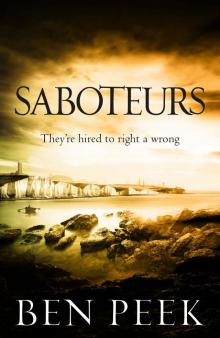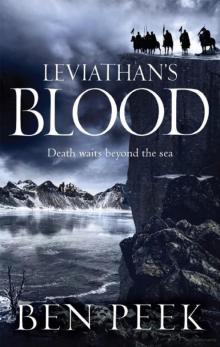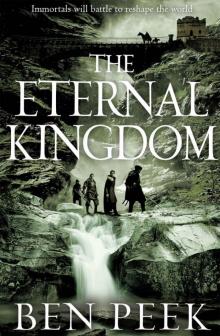Dead Americans Read online
Page 4
The warrior had never doubted the Elders before, but he did now. He could do nothing but. On the ground, beside the grey eucalyptus, lay his spear, tipped with the spines of the stingray; while out in the ocean, the dead dragged one of the great fishes from the water.
The creature was huge and grey and sacred. It had been—and would ever be—since the Eora and other tribes had begun telling the story of the ancient fisherman Jigalulu. In the story, one of the stingrays gave its life to the fisherman so that he could fashion a spear to kill the great shark Burbangi, who had murdered his father and brothers [1].
Yet, from his perch, Pemulwy watched the dead kill the stingray with a knife, and later, in the evening, watched them cook and eat it.
The Elders told Pemulwy that the dead, being dead, could do as they wished with the fish, but he disagreed. It was not just an insult to the Spirits, but an act of supreme arrogance that told the warrior that the dead did not care at all for their kin.
But it was not a solitary act.
Perhaps worse happened during the day, when the dead would take the young Eora, take their food, and take their land, giving them nothing but coloured ribbons and blankets that left them ill in ways that none had ever seen before.
Finally, on the branch of the eucalyptus tree, watching the dead eat the sacred flesh of the stingray, he was forced to answer why they acted this way.
The answer was simple:
They are not my kin.
They are invaders.
1895.
He followed the long, twisting gangplank that looped around the hulk, showing him the rotting and discoloured frame of the ship. Below him, the water was still, and pitch black, and emanated a menace that caused Twain’s old legs to tremble whenever the planks he stepped on groaned beneath his weight. Half way around the hulk, Twain knew that he did not want to continue, but his feet would not stop, and he found himself muttering in disgust to them and making his way onto the deck.
The deck was ragged, empty, and filled with invisible spirits: the till turned left and right, spun by the hands of an unseen and pointless sailor; above, the remains of the rigging flapped, trailing through the air as decayed streamers and confetti; while the cabin door to the captain’s quarters was twisted off its frame, and hanging on one hinge, the glass window shattered, leaving jagged points into the middle. Twain walked on rotting planks and passed broken railings that were circled with rusted chains.
It was a parade of death, cheering him towards the hulk’s rotting belly with relentless determination.
The smell of unwashed bodies, urine and feces overwhelmed him when he stepped onto the creaking stairs that led into the ship’s belly. Had he been anywhere else, he was sure he would have fallen, or even vomited, so tangible was the odour; but instead he continued down the stairs, one step at a time.
At the bottom of the stairs, the smell grew stronger, and the air had a heavy quality to it, but the belly of the hulk itself was empty. He had expected to see hundreds of men and women, sick, dying, and generally pitiful, huddled together, but instead he found only a thin pool of black sea water and the disintegrating ribs of the ship.
And, in the far corner of the hulk, the shadow of a man.
Twain’s feet splashed noiselessly through the black water, and the silence around him grew while the oppressive odour slipped away. He was not sure what was worse, as the silence filled his head like wet cotton, and weighed down his senses until the shadow revealed itself to be a black skinned man.
He was darker that any black man Twain had seen before; black like the water he stood in, he was naked and across his skin had been painted white bones. Yet, as Twain gazed at the bones, the paint became tangible, turning the bones solid. In response to his awareness, they began to move, shifting and twitching and cracking slightly while the man’s black flesh remained still.
Twain’s gaze was pulled away from the bones when a buttery yellow light filled the hull, illuminating a painting on the back wall. It had four rectangle panels, each panel located beneath the proceeding one.
In the first panel were two men and two women, one black and one white of each gender. The two women held babies, and wore white gowns with hoods, while the men wore trousers and shirts and had a dog beside them. The second showed an English Naval Officer (Twain did not know who) shaking hands with an Aboriginal Elder. The third panel showed an Aboriginal man being hung for killing a white man, while the fourth panel, identical to the third, showed a white man being hung for killing an Aborigine. It was, Twain knew, a message of equality, but it felt cold, and hollow for reasons he was unable to voice.
Finally, turning to the black man—an Aborigine—he said, “Is this your painting?”
“No,” he replied, the skull painted across his face moving in response, while his thick lips remained still and pressed tightly together. “It was painted by an Englishman for Englishmen, as you can clearly see.”
More confidently then he felt, Twain said, “It doesn’t have ‘English’ in big lights now, does it?”
“Look at their clothes, Mark Twain.”
Unnerved by the use of his name, Twain returned his gaze to the painting: in the first panel, as he had noted, all the men and women were dressed identically, while in the third and fourth panel, the dead Aborigines wore nothing but a loincloth and the painted symbols of their tribes.
“Equality and law rise from the English viewpoint,” the bones of the Aborigine said quietly, the tone laced with anger and resentment.
“That’s hardly a unique experience,” Twain replied, the confidence he feigned earlier finding a foothold in his consciousness.
“I am aware of this,” he said. “The Oceans of the Earth speak to me, and tell me of the English, and their Empire. And they tell me how it crumbles with revolutions, but that does not happen here, in Sydney. Other things happen here.”
Behind the Aborigine, the painting twisted and became alive: the white man stepped from his noose and shook hands with the officers, and they passed him a flask of rum. (Twain did not know how he knew that it was rum, but it was a dream and he knew not to question the logic of a dream.) In the top panel, the black man was beaten by the white man, and attacked by the dogs, while the black baby in the Aboriginal woman’s arms disappeared, and was replaced by a baby of mixed colour and heritage which began to fade until the baby was as white as the baby next to it.
“That’s a nice trick.” Twain’s foothold slipped into a vocal tremor as the scenes played themselves out in an endless loop. He cleared his throat loudly and asked, “What’s your name, then?”
“Once,” the Aborigine’s bones replied quietly, “I was called Cadi.”
1788.
Perched once again on a eucalyptus branch, Pemulwy, three weeks later, watched the skyline turn red and grey with flames and smoke. The cries of the dead pierced the night as they rushed from their tents to the wooden dwelling that held their food.
Pemulwy’s decision to fight the dead was not popular among the Eora. Elders from other tribes sent messages and warned him that the Spirits would be furious, and many warned that his own spirit, strong now, would not survive.
Last night, an Elder had sat in front of him and told him that he would die nine years from now if he followed this path, and that he would be struck down by divisions that he, Pemulwy, created in his kin. The words had rung disconcertingly true, as splits throughout the Eora were already beginning to show.
But he had no other choice. He was a warrior, and as such, he would fight the dead like any other invader into his land: he would strike their weakest targets: the houses where they kept food, and crops they were trying to grow. He would burn them, and then he would burn the men and women, and, finally, the land itself if required. Whatever the white beeàna [2] decided in response, he would also deal with.
He drew strength from the fact that a dozen other warriors, stretched throughout the
bony trees and in the bush around him, also watched the fires. He knew, gazing out at their shadowed figures, that more would come after the night. Perhaps from the dead themselves.
He did not believe that any of the dead were kin, but around the Harbour there were black skinned men that he felt a faint kinship for. It was not unreasonable, he believed, to think that they might join him—and it would certainly assure some of the worries from the Elders if he could bring one back as a friend.
He would have such a chance now:
In front of him a black figure emerged from the fire lit horizon, the harsh crack of leaves, twigs, and scrubs alerting the warrior to his presence long before he came into sight. With a cautioning wave to his warriors, Pemulwy dropped from his perch, leaving his spear balanced along the branches.
The dead was a huge figure, twice the size of Pemulwy. His face, craggy and scarred, was a pitted black stone, with wet pebbles lodged deep within, suggesting in the dark that the dead had no eyes; but he did, and they blinked rapidly, scanning the trees and path around him, before settling upon the Eora. His clothing, covered in soot, smelled of smoke, and around his wrists was a long chain, attached to the manacle on his right arm.
His teeth, when the dead smiled, were yellow and misshaped. “Deve ser o bastard que põe o fogo,” he said slowly. “Agradece.”
Pemulwy had learned a small amount of the dead’s language, but it was difficult to learn without a guide for context and meaning. Yet, knowing as little as he did, he knew that this was not their language.
Come with me, he said, pointing into the dark scrub. I will offer you shelter.
Around him, his warriors tightened in a ring above the dead, watching, waiting, protective. Unaware of them, the dead shook his head, and said, “Eu nao entendo o que você dizem, mas eu nao vou em qualquer lugar com você.” Slowly, as if trying to conceal the action, he began wrapping the length of chain around his right fist.
Pemulwy, giving him one more chance before he killed him, tapped his chest, silently, and then pointed into the bush again.
“Tive suficiente com ser cativo. Você e o Inglês,” the dead’s gaze swept the surrounding area. “São somente os mesmo a mim nesta prisão.”
“Inglês?” Pemulwy repeated, tasting the familiar word. “English?”
The dead nodded, his yellow teeth splashed against his skin. “English,” he agreed, glancing behind him. The message was clear to the Eora: the English were the white men at the fires.
Still glancing behind him, the dead suddenly swung his chain-covered fist at Pemulwy.
The warrior ducked and, darting forward, jammed his foot in the back of the dead’s knee, causing him to cry out in pain and slump to the ground. The cry sent a hot flush through him, and he bared his teeth in joy. Around the fallen man, the dozen Eora warriors emerged, one of them tossing Pemulwy his spear.
The black man—and he was a man, Pemulwy knew, just a man—began to speak, but the spear of the Eora warrior never hesitated.
Leaving his spear in the body, Pemulwy turned to the warriors. None of them had struck the dead, but they knew, by watching him, by hearing the exchange, that it was only a matter of time until they too killed the dead.
Running his fiery gaze along the semi circle of men before him, Pemulwy said, The name of our enemy is the English.
1895.
The bones across Cadi’s skin snapped together in faint clicks as the Aborigine walked through the black water of the hulk’s belly to stand before Twain.
Twain, despite his wariness, was fascinated by the features behind the white skull. It was the impression of a man sleeping, with the full, closed lips, smooth skin, and large, closed eyes. But there was nothing childlike or innocent about the Aborigine. Scars covered him in slender lines, as if a series of blades had been run again and again against his skin, and then stitched back together with a care that ultimately could not hide the damage.
“Revolutions.” When Cadi’s faint, skeleton whisper of a voice reached Twain’s ears it was harsher: raw, sad, and violent, whereas before it had sounded like a man’s. “I have tried to organize revolutions.”
“That’s a mighty large thing to do,” Twain replied. “And not always altogether successful, from my understanding of history.”
As he spoke, the ribs of the hulk melted away, and the black water had drained from his shoes; but rather than experience a dryness, the fluid was immediately replaced with new water that signalled, before he saw it, a continual silver slant of steady rain that ran over him.
Before him was an inn made from wood, with a wide, tin roofed veranda around it, and hitching posts for horses out the front. It had glass windows, while behind the glass was light provided by lanterns.
“I have tried to make symbols,” Cadi’s grating voice whispered to his left. “A revolution must have a symbol.”
Twain began to reply, but stopped.
On the veranda, dark shapes slithered into view between the rain. Allowing the Aborigine to lead him through the mud and grass, Twain approached the figures and found them to be man-like, and moments later, to be men. They wore armour that covered their torso and head, and which was made from ugly black metal: it was dented, and poorly shaped, and the helmet looked like an upended tin, with a slit cut across for the eyes.
The armour was crude and laughable, but Twain could not bring himself to acknowledge the fact. Instead, he watched the figures load their pistols and rifles and step from the porch in heavy, awkward footfalls, the silver rain washing over their dark bodies.
“Symbols,” Cadi repeated, and stepped before the figures. They paused, and he ran his bony fingers across the black armour. “A symbol to defy the English, that is what this is.”
“There’s certainly something in it,” Twain replied quietly, shivering, but not from the cold.
“It would have been pure in Sydney.” Cadi turned and raised his right arm, pointing behind Twain.
He gazed through the rain, at the graveyard of fallen branches and trees that littered the ground around the inn. At first, Twain could not see anything. But then, like ghosts emerging in the darkness, outlined by the rain, he saw them: Police Officers. The representation of English authority, scattered throughout the branches and trees, easily fifty in number, each with a rifle or pistol aimed at the four men.
“Here, it is an act of stupidity,” Cadi said.
“Stop them!” Twain cried, spinning on him. “This doesn’t need to happen!”
“It already has. All my Irishman had to do was ride into Sydney and walk down the streets, his guns drawn, dressed in this armour, demanding the release of his mother, and the heart of the nation would have gone to him. But he did not understand that, and instead, he took my revolution and wasted it here, where no one would understand.”
Twain curled his hands into fists and fought back the urge to scream out a warning to the black armoured men. Instead, trying to hide his distaste in the situation, he said, “And what exactly happened to these youngsters who didn’t go to Sydney?”
The Aborigine’s voice was faint, and touched with sadness, “Like all Australian folk legends, they died at the hands of authority.”
There was a loud crack from behind him, and, with a violent shiver, Twain felt a bullet pass through him. He clutched his chest, horrified, terrified, ready to scream out; but there was no injury, only the disconcerting echo of pain. It’s a fantasy! Nothing more than a cheap trick! The thought, rather than calming Twain, made him angry. Around him, more guns fired, the bullets fat silver streaks in the air, and the four black armoured men raised their arms and returned fire before falling back into the hotel. As they did, the windows shattered and screaming from men and women inside the inn tore out and ignited the night.
“What is the meaning of this?” Twain demanded angrily. “Why show me this tragedy? Let me go—I’ve no interest in this!”
“You must und
erstand the need for revolution,” Cadi replied, the sockets of his skull gazing intently at him. “You must understand why the heart of Sydney needs to be replaced.”
“I don’t care!” Twain hollered. “This isn’t my country, this isn’t government! This isn’t my goddamned concern!”
“No, not now. But it will be.”
Cadi thrust his bony hand into the mud. There was a faint crack, and he straightened, lifting a smooth hatch from the ground. Inside was a tightly wound spiral staircase made from wood and iron railings.
“Come, Mark Twain, and I will show you more.”
“Where’re you taking me?” Twain asked, his feet moving without his consent. He struggled against them, but realized the futility quickly.
“Into the Spirit World,” Cadi replied without emotion. “Where one step can be a day or a year or a lifetime. At the end of the stairs, you will understand the importance of this event, and why the death of an Irishman will always be remembered, if not understood.”
Twain gazed at the inn, and watched as one of the black armoured men stepped out of the front door, pistols held in his hands. Alone, a dark, iron-covered beast torn by emotions and a lifetime of injustice, he strode down the stairs, firing into the Police.
Unable to watch him fall, Mark Twain accepted his descent.
1797.
Toongagal [3] had been turned into simple sprawl of ugly, poorly built English buildings parted by a muddy stretch of road and surrounded by dirty bush land.
Pemulwy emerged from the muddy scrub, followed by the lean shadows of twenty warriors. Each man was armed with only a knife, but also carried sticks and cloth across their backs; they held nothing that would hinder their speed or their use of the land and the cloudy night sky as cover, for their goal tonight was one that relied upon stealth.
Silently, Pemulwy lead the warriors along the edge of the muddy road, leading them around the town, aiming for the isolated outpost at the opposite end.

 Saboteurs
Saboteurs The Godless
The Godless Leviathan's Blood
Leviathan's Blood Dead Americans
Dead Americans The Eternal Kingdom (The Children Trilogy Book 3)
The Eternal Kingdom (The Children Trilogy Book 3)